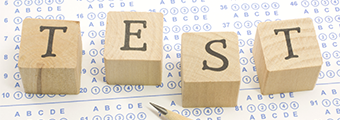Definition of school phobia and fear of schools
A phenomenon studied since the 19th century, school phobia is a very strong anxiety corresponding to the fact that young people are no longer able to go to school. The mere idea of having to go to school triggers a panic attack that can only be resolved when the young person is sure of staying at home.

School phobia: when school or a colleague becomes a source of anxiety
The diversity of manifestations that make up school phobia does not allow for a consensual definition. The most frequently cited definition is that of Ajuriaguerra, who defines it as a “situation of children who, for irrational reasons, refuse to go to school and resist with very strong panic reactions when they are forced to do so”. There is this notion of irrational fear because it seems difficult to understand that school can become such a strong source of anxiety.
When we talk about school phobia, we are talking about anxiety disorders. School is perceived as a phobogenic situation. It is as if all these fears were circumscribed around this object. The defensive mechanism used is that of avoidance (which is also found in all other forms of phobias).
School break-up as a cause of school phobia
The school environment is in essence the place of learning, both intellectually and socially, and is thus one of the privileged places for the expression of anxiety disorders. The diversity of manifestations that make up school phobia makes it more difficult to study than other forms of phobia. Moreover, the term “school phobia” is often questioned because it does not fit the traditional descriptions of other phobias. The object of the excessive fear is not clearly identified or associated with anything (teacher, classroom, teasing, leaving home, etc.). It is also too often interpreted as the young person’s own will, when in fact the young person is suffering from the situation. For irrational reasons, young people who suffer from it can no longer go to school, not because of lack of interest but because it makes them considerably anxious.
School phobia or school refusal?
Consequently, some researchers prefer the term “school phobia” to “school refusal” or “anxious refusal of school” because they have less psychopathological connotations. In a large proportion of cases, particularly for the youngest, this disproportionate resistance can be associated with a manifestation of separation anxiety disorder in the child, i.e. the intense anxiety felt at times when he or she finds himself or herself isolated from his or her parents, even for a short time. As school is intrinsically a separation instance between parent and child, it tends to trigger panic reactions that are certainly even more important than in other similar situations, but it is not the real object of the disorder.
Similarly, this break in schooling may be a result of performance anxiety expressed in the fear of doing badly and failing. As school is also a forum for evaluation and inter-individual comparison, it can be emotionally damaging for the individual, who will then systematically try to avoid returning to it. These two cases show how the panic fear of going to school cannot be explained exclusively by phobia in the strict sense of the term. However, in common usage, school phobia is a term used to describe long-lasting behaviours of insistent and irrational refusal to go to school, leading to extremely intense anxiety behaviours.
School phobia: an increasingly common phobia
According to studies, the number of children suffering from school phobia varies between 0.3 and 1.7%. More recent studies indicate that this rate has now reached 3%. The increase of this disorder is probably explained by the increasing investment of parents in schooling. Parents have more demands and concerns for their children. They want to see their success at an increasingly early age. The age of onset of disorders is mainly between 11 and 13 years, which corresponds to the start of secondary school. The prevalence is highest at this age. However, there are two peaks for school phobias: one at around 5 or 6 years of age, which corresponds to the age of entry into the first grade, and the other in the second grade at around 15 or 16 years of age. Girls are more represented at 5-7 years of age and boys are in turn more represented at 15-16 years of age. These young people generally have a normal or even above-average intellectual level (IQ). They are not failing at school, far from it, but their need to obtain good marks is underpinned by the demands of the social and family sphere.
Consult as soon as possible to limit the consequences of school phobia
Multiple factors can be at the origin of school phobia: bullying, performance anxiety (fear of not meeting parental requirements), humiliation by peers, fear of evaluation, fear of separation. It is this multiplicity of causes that makes it difficult to estimate precisely the number of children who suffer from it.
School phobia is a disabling condition that seems to be on the increase. Young people are unable to go to school. It needs to be detected as early as possible by child psychiatrists and doctors, but also by teachers, because the consequences are obvious in the short and medium term.


